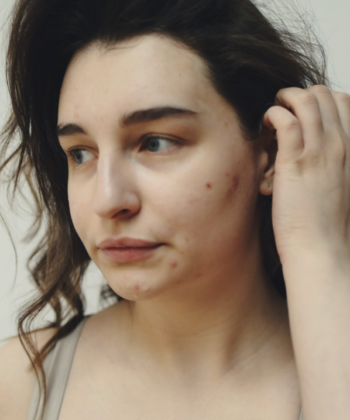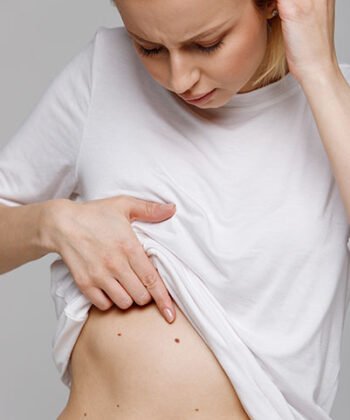The Truth About Acne
Acne is a debilitating disease that affects over 18 million people in the UK. A lot of people say it’s a teenage issue that you can grow out of, but it affects many people right through to their adult life and can completely take over people’s lives.
Acne has become more common over the years and could be attributed to global changes in diet, the environment, and our work and stress levels. The majority of individuals that suffer from acne experience this during puberty and following this it usually subsides, but there are numerous other factors which can influence the development of this skin condition. Below are seven common factors that influence skin health and the development of acne.

Your genetic influence
Unfortunately, this is completely out of your control and there is nothing that you can do regarding the inheritance of your genes. Research has shown that there is a strong link between genetics and the development of acne; you are five times more likely to develop acne as a teenager or an adult if one of your immediate relatives has suffered from the condition. However, it’s not all down to genes; there may be certain lifestyle choices that you make which may help you to avoid this skin condition.
Your lifestyle choices and the environment
Dietary choices and the external environment can have an impact on the condition of your skin. Not everyone is affected equally and certain individuals may be more affected by certain dietary components than others. Over the last two hundred years people’s lifestyles have changed drastically, with chemicals in cleaning products, fragrances, air pollution and changing diets being factors that can contribute to the condition of one’s skin.
There is some evidence that supports a link between dairy products and the development of acne, your cheese toastie or ice cream on the weekend may be contributing to the development of your acne. Trying to cut back on dairy products for a couple of weeks may reduce your chances of getting spots.
We see patients in the clinic who have responded well to dietary changes whereas others simply do not. Treatment of acne is very individual and there isn’t a one size fits all solution unfortunately.
Keep an eye on your waistline
Keeping your weight under control is important for your overall health, reducing your chances of developing other systemic diseases such as diabetes and our disease. Your weight can also have an impact on the condition of your skin. Research that shows that the development of acne is higher in adolescents with a higher BMI. This comes down to dietary control; eating high-fat sugary foods can lead to the stimulation of grease production and inflammation in the skin which are both factors that can lead to the development of acne. Make sure you consume a healthy, balanced diet with plenty of water and fluids throughout the day making sure that your body is kept in good condition from the inside out.
Kick the smoking habit
It is a well-known fact that smoking is linked to the development of numerous life-threatening conditions. Smoking can lead to the development of blackheads and can cause premature ageing of your skin and give it a dry and grey tone. There is no doubt that quitting smoking can improve the overall appearance of your skin as well as numerous other health benefits.
Your hormones are out of control!
For women, menstrual cycles can cause fluctuations in the appearance of their skin due to the hormonal changes that take place from month to month. Many female patients report flaring up of their acne during their menstrual period. We can control these hormones in the management of acne treatment. Circulating testosterone in the blood increases the levels of sebum in the skin which in turn can cause acne. The contraceptive pill contains oestrogen which can act to reduce the circulating levels of testosterone and therefore help to control acne. Some oral contraceptives are more effective than others for the management of acne.
Reduce your stress levels
Stresses and strains of modern-day life can result in an exacerbation of acne. We see many patients whose acne condition becomes more severe during periods of high stress. This stress can be work or life-related.
When an individual experiences high levels of stress the body produces certain stress hormones that cause an increase in blood pressure, affect the immune system and can cause inflammation of the skin. There are many skin conditions in addition to acne that are also made worse by stress such as hives and psoriasis.
Try to reduce your overall stress levels by following a daily exercise regime or any form of activity that helps you unwind.
Beware of hidden chemicals in you cosmetics
There are certain chemicals which are found in cosmetics that can cause acne such as lanolin and petrolatum. If you are not sure whether or not your cosmetics are making your acne worse try switching to chemical free simple cosmetics or book an appointment with a dermatologist and take your cosmetics along to the appointment.
If you have made changes to your lifestyle, diet, reduced stress levels and tried various over-the-counter remedies and your acne still persists then booking an appointment with a qualified specialist dermatologist should be your next port of call.
If you have any concerns about acne or any other skin conditions book an appointment with one of our private consultant dermatologists to get an expert opinion on what can be done.

Medically reviewed by Dr. Daniel Glass
UK trained Consultant Dermatologist Dr Daniel Glass is a General Medical Council registered skin specialist, qualified in both adult and paediatric Dermatology.











